|
|
|
Sort Order |
|
|
|
Items / Page
|
|
|
|
|
|
|
| Srl | Item |
| 1 |
ID:
188778


|
|
|
|
|
| Summary/Abstract |
This Rapid Communication asks why so much attention was paid to Ukrainian state- and nation-building as negative phenomena and so little to the jingoist nationalism in Russia in the lead-up to the invasion of Ukraine. The question has become all the more urgent after 24 February 2022. The war has confirmed the deep commitment of Ukraine’s citizens to their nation and state, and to a history that has been obscured by geopolitical grandstanding in Russia and by preconceived views of nationalism in the West.
|
|
|
|
|
|
|
|
|
|
|
|
|
|
|
|
| 2 |
ID:
106245
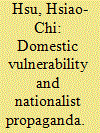

|
|
|
|
|
| Publication |
2011.
|
| Summary/Abstract |
In early 2006, President Chen Shui-bian of Taiwan surprised domestic and international audiences by announcing his intention to scrap the symbolically important National Unification Council (NUC) and the Guidelines for National Unification (GNU). This announcement not only invited strong criticism from Beijing, but also seriously strained U.S.-Taiwan relations, because it was a clear violation of Chen's 2000 inaugural pledge regarding cross-Strait policy. This policy proposal presented an important theoretical challenge to the broadly recognized election cycle model in Taiwan's mainland policymaking- unlike Chen's earlier nationalist propaganda, the NUC initiative came after instead of during a major election campaign. To address this anomaly, this paper argues that while domestic politics play a key role in Taiwan's mainland policymaking, gaining votes is not the state leader's only concern. A careful examination of the political context shows that Chen's NUC campaign was used to divert attention from his personal political crisis following on his loss of both control over policy and leadership over his party after the DPP's poor showing in the December 2005 elections for city mayors and county magistrates.
|
|
|
|
|
|
|
|
|
|
|
|
|
|
|
|
| 3 |
ID:
144919
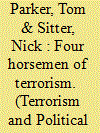

|
|
|
|
|
| Summary/Abstract |
David Rapoport's concept of Four Waves of terrorism, from Anarchist terrorism in the 1880s, through Nationalist and Marxist waves in the early and mid-twentieth century, to the present Religious Wave, is one of the most influential concepts in terrorism studies. However, this article argues that thinking about different types of terrorism as strains rather than waves better reflects both the empirical reality and the idea that terrorists learn from and emulate each other. Whereas the notion of waves suggests distinct iterations of terrorist violence driven by successive broad historical trends, the concept of strains and contagion emphasizes how terrorist groups draw on both contemporary and historical lessons in the development of their tactics, strategies, and goals. The authors identify four distinct strains in total—Socialist, Nationalist, Religious, and Exclusionist—and contend that it is possible to trace each strain back to a “patient zero” active in the 1850s.
|
|
|
|
|
|
|
|
|
|
|
|
|
|
|
|
| 4 |
ID:
092959


|
|
|
|
|
| Publication |
2009.
|
| Summary/Abstract |
This article revisits Rosemary Sayigh's theory of "culture as resistance" and considers how primordial attachments of kin and village, and by extension nation, in Shatila camp are being reconfigured by deepening poverty and provisionality. Shifting analytical attention away from the discursive continuities of nationalism toward the contingencies of everyday material practice in its local environment, the article examines how dynamically evolving networks of solidarity are reconstituting traditional structures of kinship and political belonging, broadly conceived, and producing new forms of agency and economic subjectivity for camp women.
|
|
|
|
|
|
|
|
|
|
|
|
|
|
|
|
| 5 |
ID:
066173
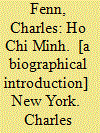

|
|
|
|
|
| Publication |
New York, Charles Scribner's sons, 1973.
|
| Description |
144p.Hbk
|
| Standard Number |
684133504
|
|
|
|
|
|
|
|
|
|
|
|
Copies: C:1/I:0,R:0,Q:0
Circulation
| Accession# | Call# | Current Location | Status | Policy | Location |
| 013190 | 923.1597/FEN 013190 | Main | On Shelf | General | |
|
|
|
|
| 6 |
ID:
113652
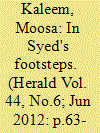

|
|
|
| 7 |
ID:
160965
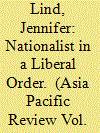

|
|
|
|
|
| Summary/Abstract |
In the past few years, many wealthy democracies have exhibited significant backlash against the liberal international order. Why has Japan—also a leader of this order—remained comparatively calm? I argue that though Japan was a prominent member of the liberal international order, in many ways it pursued policies far less liberal than those of its partners. Japanese trade policies (lingering trade barriers in in agriculture and non-tariff barriers in industrial sector) protected different sectors of the Japanese economy. Where Japan did liberalize, the government upheld the social compact of extending benefits to dislocated workers. Furthermore, Japan’s strict immigration policy contrasts with far more welcoming immigration policies in Europe and the United States. Tokyo deferred to public skepticism about immigration (rather than disregarding it, as did American and European leaders). The more nationalist agenda of a leading liberal state is critical for understanding both the roots of the current crisis in the liberal international order—and how it might be saved.
|
|
|
|
|
|
|
|
|
|
|
|
|
|
|
|
| 8 |
ID:
096582
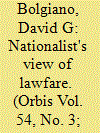

|
|
|
|
|
| Publication |
2010.
|
| Summary/Abstract |
Many lawyers, military legalists, scholars, and policymakers continue to march the United States down the road to full membership in the International Criminal Court (ICC). This article explores the darker side of such a trek, from both legal and strategy perspectives, by examining three important fracture points that make joining the ICC irreconcilable with our Constitutionally-based republican form of government: Constitutionally protected individual rights; the American legal notion of the individual right of self-defense, and the influence of Sharia law.
|
|
|
|
|
|
|
|
|
|
|
|
|
|
|
|
| 9 |
ID:
111665


|
|
|
|
|
| Publication |
2012.
|
| Summary/Abstract |
Alec Salmond's SNP, old politics and fingertips, won a landslide. The Lib Dems, free to confine the Tory plurality, chose the wooden spoon of office.
|
|
|
|
|
|
|
|
|
|
|
|
|
|
|
|
| 10 |
ID:
151095
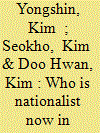

|
|
|
|
|
| Summary/Abstract |
This study examines the major sources of Chinese new nationalism among the Chinese populace two decades after the 1989 Tiananmen movement. Based on the 2008 East Asian Social Survey (EASS) using China data collected nationwide, this research finds that China’s major sources of popular nationalism in 2008 are largely consistent with “New Left” intellectuals’ propositions. In contemporary China, Chinese national identity is premised on identification with Asia rather than Western countries and Japan as the “other” that supports China’s self-image as a “victim”. This new identity boundary has enabled the positive roles and traits of Confucian culture to build and shape Chinese new nationalism.
|
|
|
|
|
|
|
|
|
|
|
|
|
|
|
|
|
|
|
|
|